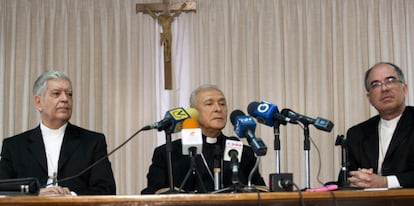Catholic Church blames Maduro for violence in Venezuela
Religious leaders call on opposition and government to initiate a dialogue based on “mutual respect”

The Catholic Church in Venezuela on Wednesday became the latest sector to publicly condemn the government of President Nicolás Maduro for the way it has handled the political and social unrest that has gripped the country since early February.
In a 12-point statement, the Venezuelan Episcopal Conference called on Maduro and opposition leaders to initiate a frank dialogue aimed at “building a new relationship based on mutual respect.” Nevertheless, the bishops’ declaration directly put the blame for the nationwide violence – which has left at least 39 dead and more than 600 injured – on the government.
Monsignor Diego Padrón, who heads Venezuela’s conference, said that the current social and economic crisis was due to a restructuring plan (Plan for the Fatherland) initiated by the late President Hugo Chávez.
“Within it they are hiding the promotion of a totalitarian-style system of government, putting in doubt its democratic credentials,” he said, reading from a statement.
The Church also condemned protestors for instilling violence
To support their theory, Church officials give examples of press restrictions, lack of safeguards against judicial persecution, harassment of the private sector, and “the brutal repression of political dissidents, as well as threats, verbal attacks and physical violence to silence them.”
The statement marks the first time that Venezuelan Catholic Church officials have publicly commented on the situation since the protests began on February 12.
The statement also comes just days after Amnesty International issued a critical report against the Maduro government that cites examples of alleged torture and beatings by law enforcement officials against students and other protestors.
Government officials had no immediate reaction to the Church’s statement. Maduro has said that he is willing to accept an offer by the Vatican to mediate in the crisis.
But the Church also condemned some sectors of the protest movement for instigating violence and vandalizing public and private properties.
“Street barricades and attacks on people and institutions, such as the burning of private and public vehicles, are examples in which a situation is being created that should neither be accepted or applauded,” he said, reading from his statement.
Tu suscripción se está usando en otro dispositivo
¿Quieres añadir otro usuario a tu suscripción?
Si continúas leyendo en este dispositivo, no se podrá leer en el otro.
FlechaTu suscripción se está usando en otro dispositivo y solo puedes acceder a EL PAÍS desde un dispositivo a la vez.
Si quieres compartir tu cuenta, cambia tu suscripción a la modalidad Premium, así podrás añadir otro usuario. Cada uno accederá con su propia cuenta de email, lo que os permitirá personalizar vuestra experiencia en EL PAÍS.
¿Tienes una suscripción de empresa? Accede aquí para contratar más cuentas.
En el caso de no saber quién está usando tu cuenta, te recomendamos cambiar tu contraseña aquí.
Si decides continuar compartiendo tu cuenta, este mensaje se mostrará en tu dispositivo y en el de la otra persona que está usando tu cuenta de forma indefinida, afectando a tu experiencia de lectura. Puedes consultar aquí los términos y condiciones de la suscripción digital.








































